R. Joseph Hoffmann's Blog: Khartoum, page 20
October 25, 2014
Villanelle: The Book in General
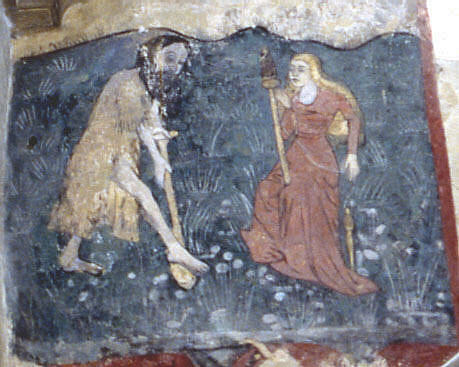
God was the source and center of this love.
You were the wish he wished in Babylon.
I was the soul he lost within the grove.
Some say that Huwa drove the man to move
Beyond the garden walls. Some say that none
Thought God the source and center of this love.
And once cast out they found an obscure trove
Stock full of seeds. They sowed them one by one,
The souls that he had lost within the grove.
But it was beastly work, and though they strove
To finish it, the job was never done:
He was no more the center of their love.
They built a temple, built it high above
The ancient city wall where priests could shun
The souls that had been lost within the grove.
They made two silver gates in memory of
The garden God had planted neath the sun
When he was yet the center of their love,
Before the souls were lost within the grove.
Published on October 25, 2014 21:30
October 24, 2014
A Further Wish
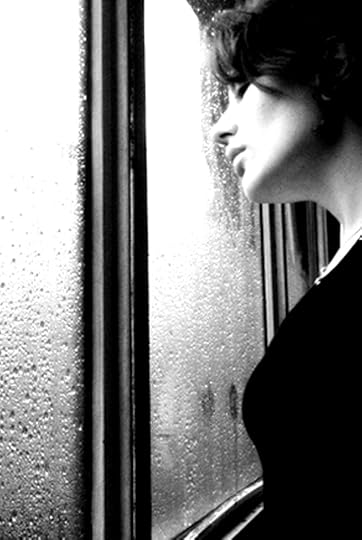
Love is pushing the last thing
You loved out the window
Of your memory. Falling
And moving like blowing sand
On a dark day, it happens
Not to bodies but to souls
Looking for a way to sense
The world without tools
Or avatars. There’s no sadness
When souls fall, because we know
That’s how a soul fastens
Onto a world and how it goes
Back to heaven. So, no surprise
That the soul I saw in you
Was my soul once: In my eyes
You saw a veiled life as a new
Possibility. It took a touch, a laugh
a strange prophetic silence
to destroy the false book
I had been reading, in one glance.
We share this soul like the wind
Shares the earth: it breathes love
And moves us, until we find
Each other in it and can no longer move.
Published on October 24, 2014 23:16
October 22, 2014
Vespers
I am sitting on a bench watching the day die.
It is at 42nd street, like the song, and October
Like the season. You are in Pakistan where I found you
And left you without disturbing for a moment
The proud, quiet and terrified child I dreamed about.
It is six o’clock; there are runners and bankers
Going home past me, sweating to be thin,
Grunting to be richer. What do they carry in their cases?
I don’t know: I am thinking you might say “cats.”
Here in the soft orange Manhattan night
In autumn weather I am in Lahore and it is May
And scorching hot. I walk into a classroom at seven.
Someone says that prayers have changed:
People will be late. I can start if I want to.
You are there, half smiling at my confusion (you
Will not remember this) so I start and people come.
I want to say: Miss, let us go out into the hot night
Let’s stand under the moon while the peacocks sleep.
I will touch your cheek and you will look into my
Eyes and I will never have to say another word.
A woman with a white cardboard cup sits down
Next to me and says What a life. It is New York
So I cannot disagree. She says looking ahead,
Did you have a good day? I want to say, Not bad;
I say It was a day because that will make her laugh.
She laughs. I know what will come next.
But I am in Lahore and you are looking at me:
The birds are quiet in the trees
And you cannot look at me for long because, after all,
It is late and the dark is thick and full of promise.
I could use a coffee I say to her, looking at her.
I could use more, she says looking down.
In Lahore I take your hand. I touch your hair
You are like holding the salt spray against the wind--
That soft and that ephemeral: you blow through me.
You leave my hair a mess and my cheeks wet with your breath.
In the soft orange Manhattan night in perfect weather
You are what I see when I see the moon
Above the Hudson shining on us, wanting more.
It is at 42nd street, like the song, and October
Like the season. You are in Pakistan where I found you
And left you without disturbing for a moment
The proud, quiet and terrified child I dreamed about.
It is six o’clock; there are runners and bankers
Going home past me, sweating to be thin,
Grunting to be richer. What do they carry in their cases?
I don’t know: I am thinking you might say “cats.”
Here in the soft orange Manhattan night
In autumn weather I am in Lahore and it is May
And scorching hot. I walk into a classroom at seven.
Someone says that prayers have changed:
People will be late. I can start if I want to.
You are there, half smiling at my confusion (you
Will not remember this) so I start and people come.
I want to say: Miss, let us go out into the hot night
Let’s stand under the moon while the peacocks sleep.
I will touch your cheek and you will look into my
Eyes and I will never have to say another word.
A woman with a white cardboard cup sits down
Next to me and says What a life. It is New York
So I cannot disagree. She says looking ahead,
Did you have a good day? I want to say, Not bad;
I say It was a day because that will make her laugh.
She laughs. I know what will come next.
But I am in Lahore and you are looking at me:
The birds are quiet in the trees
And you cannot look at me for long because, after all,
It is late and the dark is thick and full of promise.
I could use a coffee I say to her, looking at her.
I could use more, she says looking down.
In Lahore I take your hand. I touch your hair
You are like holding the salt spray against the wind--
That soft and that ephemeral: you blow through me.
You leave my hair a mess and my cheeks wet with your breath.
In the soft orange Manhattan night in perfect weather
You are what I see when I see the moon
Above the Hudson shining on us, wanting more.
Published on October 22, 2014 10:27
October 17, 2014
Canto II: Baneen
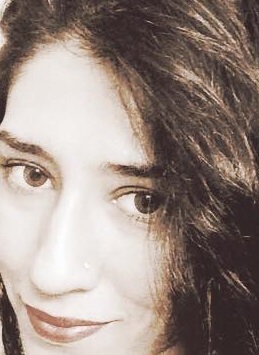
When Dante visited the moon
Beatrice explained about vows.
“A vow’s a pact, ” she said
“between man and God,
but moons come and go,
so don’t swear by them.”
Maybe he laughed at that,
because she was young,
and had no right
lecturing him in his dreams,
a spirit torn from his side.
What can a girl know about vows?
When he first saw her,
she was trembling like a dove.
She said, “You’ll have to go
through strange gates
and dark alleys
into cities wet with spilled excuses.
You’ve got to pass this way.
There’s no short cut.
"You’ll see
whatever you want to see.
On the other side,
there is a mountain
and from the top ledge
you can see God.
It’s worth it, though
–the crossing:
He is beautiful,
and the best thing is,
no one who sees him
remembers anything
they’ve seen before,
not the crying,
not being stung by wasps.
Not the smell
of the Florentine women–
‘Donne, ch’avete intelletto d’Amore’–
Ladies who know all about love.’
“You’ll forget
having your eyelids pierced
and weighted with leaden pendants
so that you can can’t see truth
staring you in the face.
It’s rumour, of course,
but God’s more beautiful
than the moon.”
So they walked
towards the river
and for the first hundred yards
she held his hand.
Then he stumbled.
It was dark
when he climbed
into the rotting boat
that smelled like
all the sins
he had committed as a child.
He wasn’t sure,
in the dark,
in the cloak,
But he thought it was her.
He wanted it to be her.
He rode
the yellow sadness of Acheron,
filled with naked men,
eyes alight with flaming coals.
He saw
starved falcons overhead,
thick as mosquitoes
over a dead lake.
He saw
Charon lobbing his oar
against bodies
clutching the sides of the boat
turning the way
forward into a slow trawl.
He saw
pale arms rising
and falling back
into the black torpor,
drowning in waltz time,
in little circles.
“It’s too much.” he said:
“Here’s an extra five dollars,
I don’t care
how beautiful God is.
Take me back.”
He turned to her,
but he saw instead
the shadow of a poet who said,
“I’ll take you farther.
You must go farther,
because, as She said,
there is a mountain
you’re meant to climb.
She wants it for you.”
“I have no legs,
for mountains,” he said,
“I do not want
To be a poet.
I do not want to drown.”
But by then the boat
had forked upriver:
Charon grinned
as the water widened.
She stood on the other side,
a firelight on the shore
fading
like the glow
of the moon
behind a broken cloud.
Published on October 17, 2014 08:47
October 12, 2014
The Pumpkin by Day
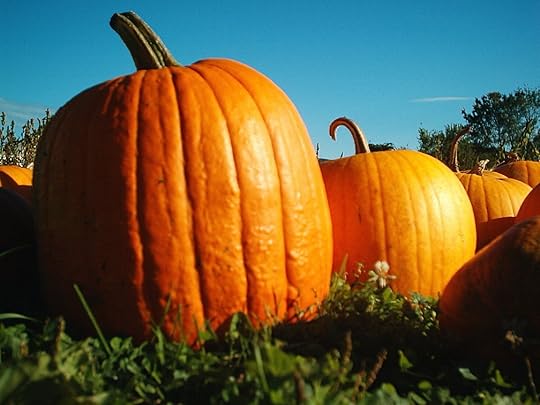
for r.b.d.
Pumpkins are big and orange-yellow things
And inside they have pulp and meat,
Which everyone calls pumpkin brains
And strands of orange, and irritating seeds.
You cannot dive into a pumpkin, lass.
It takes years of practice and a steady hand
Around the stem to make the thing a lid;
You cannot rush it and be sorry if you did.
I knew a pumpkin once; he loved a human girl
But had no eyes, nor mouth to say I love.
She took him from the patch and as with lace
Began to knit a rudimentary pumpkin face.
She made his eyes like stars, and then a nose--
Two small circles and a fine curved line above--
But when it came to giving him a mouth
She paused and frowned and said I mustn’t rush.
She asked her friends what kind of mouth to make.
They said, "With pumpkins mouths are everything
For out of mouths come curses and the light
Of candles glowing through the night."
He’s not that kind of pumpkin, she replied.
Maybe I’ll give him no mouth at all.
Why should pumpkins have the power to say
by night the things they would not say by day?
She took the knife, and carved for him one ear.
Into that ear she said: I gave you eyes like stars
I could have left you in the dirt you know--
I’m doing this to make your conscience grow.
She said, This ear must never hear a thing
Calumnious and think it true.
Or listen to the things that may distract
A pumpkin in his day to day entr’acte.
She took the knife and slowly traced a mouth
Then sliced the fiber open to the core.
Until the eyes above began to shine.
She said to him, Now pumpkin you are mine.
At those few words, his glow increased to heat.
She backed away, for fear of being scorched.
The mouth was moving, bottom and above.
The words were in him, and he said ‘I love.’
Published on October 12, 2014 00:37
October 8, 2014
Sonnet 14, ibn Kathir
(14.35)
وَإِذْ قَالَ إِبْرَاهِيمُ رَبِّ اجْعَلْ هَٰذَا الْبَلَدَ آمِنًا وَاجْنُبْنِي وَبَنِيَّ أَنْ نَعْبُدَ الْأَصْنَامَ
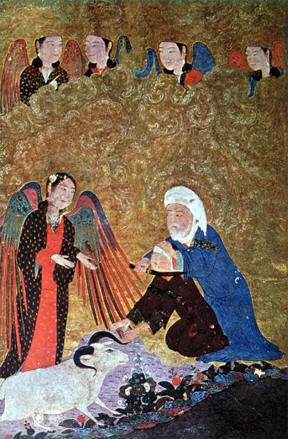
Then Abram went outside the city gate
Cursing Azar, the idols he had made
By his own hand, his brothers, the whole parade
Of jag-toothed deities of wood and slate.
He thought he heard God say, My dearest son
Fathers can be stubborn, but the test
Of fatherhood –I’m sorry—does not rest
On you or on your kith: it is no fun
Being a father—I should know--for I
Have had as many sons and daughters as
There are stars in heaven. And I was
(Like Azar) abandoned to the human lie.
That gods can live without your constant love--
That only fathers have the need to prove.
وَإِذْ قَالَ إِبْرَاهِيمُ رَبِّ اجْعَلْ هَٰذَا الْبَلَدَ آمِنًا وَاجْنُبْنِي وَبَنِيَّ أَنْ نَعْبُدَ الْأَصْنَامَ

Then Abram went outside the city gate
Cursing Azar, the idols he had made
By his own hand, his brothers, the whole parade
Of jag-toothed deities of wood and slate.
He thought he heard God say, My dearest son
Fathers can be stubborn, but the test
Of fatherhood –I’m sorry—does not rest
On you or on your kith: it is no fun
Being a father—I should know--for I
Have had as many sons and daughters as
There are stars in heaven. And I was
(Like Azar) abandoned to the human lie.
That gods can live without your constant love--
That only fathers have the need to prove.
Published on October 08, 2014 02:25
October 6, 2014
The Companion
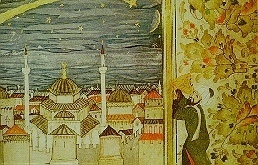
In me there is
something like you,
for my soul is like you,
a place where I can kneel
and pray:
a masjid, a shrine,
my altar and my sacrifice.
This prayer is as quiet
as dawn,
as open as the sea.
It has no roof, no walls,
only a Name: Rabī'ah
In this place there is
only love.
The idols
have been smashed
and candles and shadows have
been replaced by the open sky,
open to all possibility,
finding
only itself.
In this place
there are dreams,
there is pleasure
where ecstasy is poured into itself
and becomes lost.
Where you think
there are others, but there
is only a rush of wings,
souls and no body.
And in my soul,
where you are
a temple,
a shrine, a mosque,
my thoughts dissolve into you
and you become my prayer
Published on October 06, 2014 01:44
October 5, 2014
Surah XII

Pharaoh dreamed
that he was standing by the Nile.
He dreamed the river went
from white to red and
out of the river came seven cows, sleek and fat,
and they fed in the reed grass.
Then seven other cows, gaunt and thin
and the gaunt and thin cows
devoured the seven sleek and fat cows.
And the king awoke crying for Joseph.
“By Aton, by the radiant sun, I will
die tomorrow—Oh! my poor wives
and bakers and architects and priests.”
But Joseph was dreaming too:
Dreaming of goat-blood and wells and
the sons of Ishmael who brought him as a slave
to Potiphar–and the priest’s wife saying
“He does not know how to love a woman.
Take me and love me, Joseph, or I
will tell him you raped me. And he will
believe me because I am his wife.
Lie back on the silk, arch your back
over the cushion; I will do the rest.”
Joseph woke to the cries of Pharaoh
reeling into the room, his robe twisted
into a knot around his neck.
“What does it it mean: cows do not
eat cows. Does it mean my death,
Zaph′enath-pane′ah? ” No, Joseph said
rubbing crust from his eyes and the memory
of the woman’s perfume. “It means
nothing like that–it means other men will
starve: children, mothers and grandfathers
mainly, Nothing to do with us. You are the sun.
You cannot starve or be deprived of brightness.”
Pharaoh clapped his hands: “Praise Aton,
I was hoping it was something like that.
I am sorry about Potiphar’s wife–always the slag;
But I will give you As’enath—you’ll have sons--
I’ll fill your grain stall and your belly will
always be full of wine, your bed never empty;
I will kill the baker for you–
I will kill Potiphar and give you his head
as a token of my love for you–
Only please, never leave my side
Joseph, Joseph I need you at my side.”
The Hebrew looked closely at the king’s face:
There was the brown study that comes
from fright and superstition,
too many dreams, and too little rest.
“I will, my Lord: I will stay—for a while. Only
do this: Wash your hands, and your feet.
Bring beer and meat and bread, bring your sons
and I will summon my faithless brothers
and Benjamin from my father’s house,
and we will all sit together—recline together.
We will eat together.”
“Ah! Joseph," said the king—“You ask too much.”
Published on October 05, 2014 17:23
September 23, 2014
Wedding
Not hairy men
but the smooth dark shaft;
not bricolage but
blood coursing,
the undulating piercing vein
--not a European craft--
but feint Egyptian pokes
devoid of passion as the
body thrusting hopes for
a perfumed paradise,
hopes for bodies--not yours--
hopes for anything but you
after a year or two
(or three or four)
hopes for a runaway carriage
and incense, henna and more
and a different marriage.
but the smooth dark shaft;
not bricolage but
blood coursing,
the undulating piercing vein
--not a European craft--
but feint Egyptian pokes
devoid of passion as the
body thrusting hopes for
a perfumed paradise,
hopes for bodies--not yours--
hopes for anything but you
after a year or two
(or three or four)
hopes for a runaway carriage
and incense, henna and more
and a different marriage.
Published on September 23, 2014 06:16
September 19, 2014
Paul Apostle of God to the Corinthians (1.14.4-7)
Love waits--
Love is sweet.
Love does not own anyone
nor conquer anything.
Love is quiet.
It subdues no one
even when it wants its way.
Love destroys anger:
it keeps no record of offenses
and forgives without reason.
Love hates what is not love
and dances to the truth.
It spreads its wings.
It asks the beloved to trust
and to hope
and to wait.
In its flight,
it never falls.
Ἡ ἀγάπη μακροθυμεῖ, χρηστεύεται ἡ ἀγάπη, οὐ ζηλοῖ, ἡ ἀγάπη οὐ περπερεύεται, οὐ φυσιοῦται,οὐκ ἀσχημονεῖ, οὐ ζητεῖ τὰ ἑαυτῆς, οὐ παροξύνεται, οὐ λογίζεται τὸ κακόνοὐ χαίρει ἐπὶ τῇ ἀδικίᾳ, συνχαίρει δὲ τῇ ἀληθείᾳ·πάντα στέγει, πάντα πιστεύει, πάντα ἐλπίζει, πάντα ὑπομένει. Ἡ ἀγάπη οὐδέποτε πίπτει.
Love is sweet.
Love does not own anyone
nor conquer anything.
Love is quiet.
It subdues no one
even when it wants its way.
Love destroys anger:
it keeps no record of offenses
and forgives without reason.
Love hates what is not love
and dances to the truth.
It spreads its wings.
It asks the beloved to trust
and to hope
and to wait.
In its flight,
it never falls.
Ἡ ἀγάπη μακροθυμεῖ, χρηστεύεται ἡ ἀγάπη, οὐ ζηλοῖ, ἡ ἀγάπη οὐ περπερεύεται, οὐ φυσιοῦται,οὐκ ἀσχημονεῖ, οὐ ζητεῖ τὰ ἑαυτῆς, οὐ παροξύνεται, οὐ λογίζεται τὸ κακόνοὐ χαίρει ἐπὶ τῇ ἀδικίᾳ, συνχαίρει δὲ τῇ ἀληθείᾳ·πάντα στέγει, πάντα πιστεύει, πάντα ἐλπίζει, πάντα ὑπομένει. Ἡ ἀγάπη οὐδέποτε πίπτει.
Published on September 19, 2014 06:54
Khartoum
Khartoum is a site devoted to poetry, critical reviews, and the odd philosophical essay.
For more topical and critical material, please visit https://rjosephhoffmann.wordpress.com/
Khartoum is a site devoted to poetry, critical reviews, and the odd philosophical essay.
For more topical and critical material, please visit https://rjosephhoffmann.wordpress.com/
...more
For more topical and critical material, please visit https://rjosephhoffmann.wordpress.com/
Khartoum is a site devoted to poetry, critical reviews, and the odd philosophical essay.
For more topical and critical material, please visit https://rjosephhoffmann.wordpress.com/
...more
- R. Joseph Hoffmann's profile
- 48 followers



